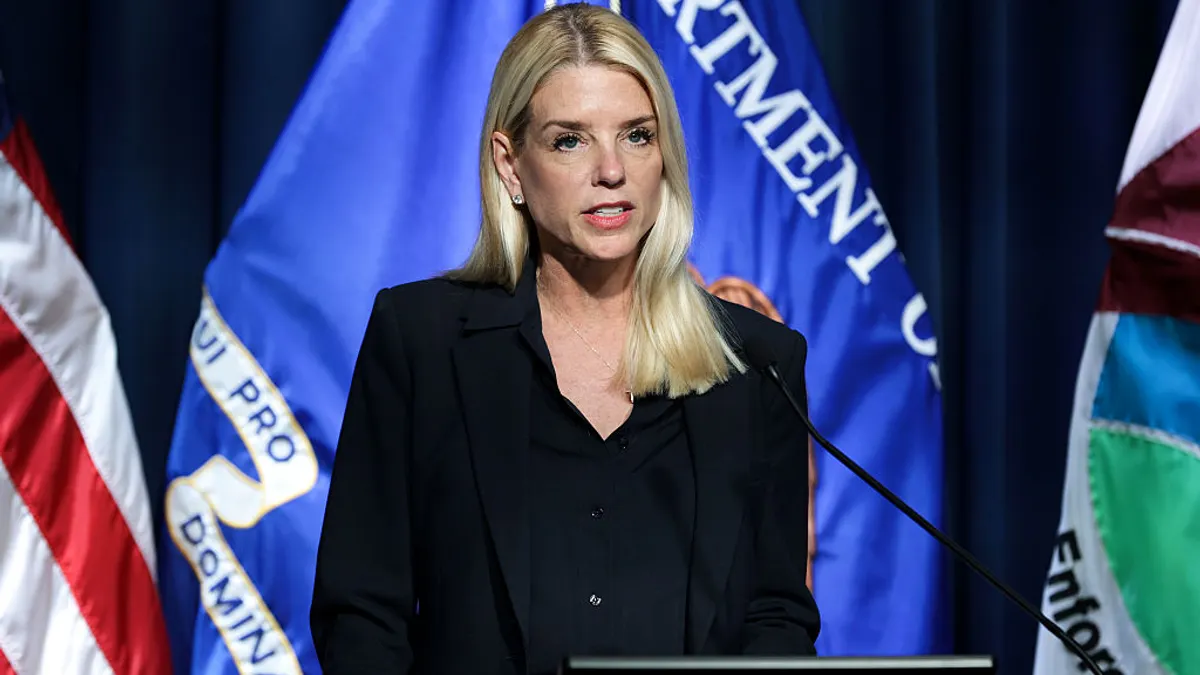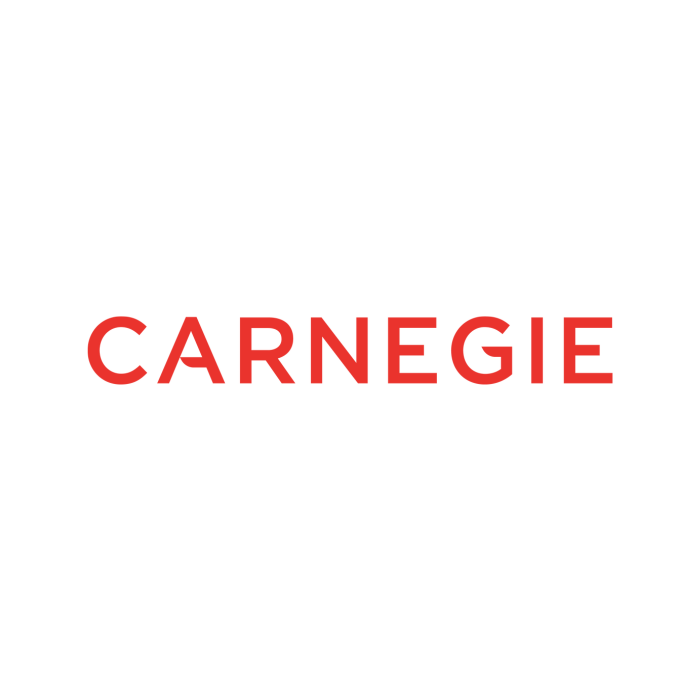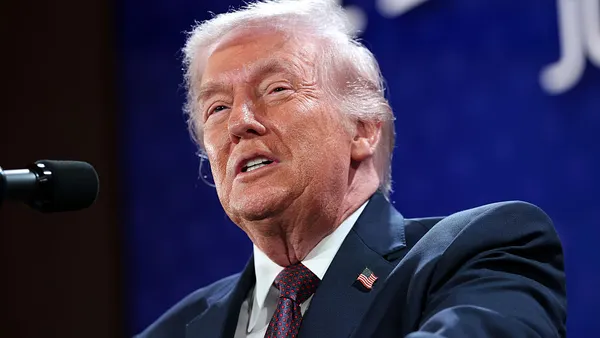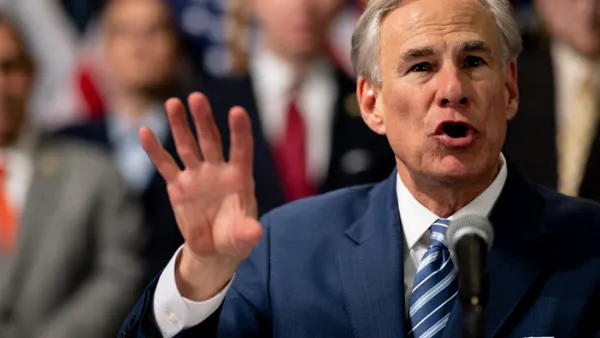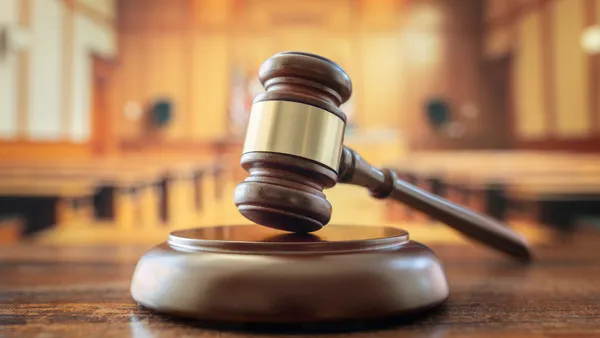Dive Brief:
- The U.S. Department of Justice released guidance Wednesday that threatens to strip grant funding from colleges and other federally funded institutions over what the agency deems unlawful diversity, equity and inclusion practices.
- The agency’s memo targets a sweeping set of practices, including offering race-based scholarship programs, allowing transgender women to access bathrooms that correspond with their gender identity and having identity-based lounges or study spaces on campus — even if they are open to all.
- But the nine-page memo goes a step further, saying even neutral criteria — such as recruitment strategies targeting certain regions — could be deemed unlawful if the Justice Department determines they are chosen because of their demographic composition.
Dive Insight:
The Justice Department’s memo comes after a federal judge temporarily blocked similar guidance from the U.S. Department of Education that broadly targeted diversity, equity and inclusion programs at federally funded colleges and K-12 schools. The order came in response to a lawsuit that alleged the guidance “radically upends” federal antidiscrimination laws.
The guidance from the Justice Department illustrates the major shift in how the agency under President Donald Trump approaches enforcement of civil rights laws, with officials now targeting programs that were often actually launched to fight systemic discrimination.
Earlier this month, the National Urban League declared a “state of emergency” for antidiscrimination policies, calling the Trump administration’s overhaul of the Justice Department’s enforcement priorities “an existential threat” to civil rights laws, according to The Associated Press.
Like the Education Department’s blocked guidance, the Justice Department’s new memo warns that government officials could pull federal funding from institutions that don’t comply. That threat comes at the same time the agency has ramped up investigations into colleges over their diversity initiatives and their responses to antisemitism on campus.
The DOJ memo contains examples of practices it lists as “unlawful” and says could lead to federal funding being revoked, as well as a list of recommendations, which it says are not mandatory, to avoid "legal pitfalls."
“This Department of Justice will not stand by while recipients of federal funds engage in illegal discrimination,” U.S. Attorney General Pamela Bondi said in a Wednesday statement. “This guidance will ensure we are serving the American people and not ideological agendas.”
As examples of unlawful practices, the agency highlighted race-based scholarships or programs, including mentorship programs or leadership initiatives reserved for members of certain racial groups.
The memo could upend admissions. It recommends colleges end programs "designed to achieve discriminatory outcomes" even if they have “facially neutral” criteria, such as targeting scholarships to certain regions to increase enrollment or participation among certain racial groups.
“Instead, use universally applicable criteria, such as academic merit or financial hardship, applied without regard to protected characteristics or demographic goals,” the memo said.
The memo also takes aim at what it describes as “unlawful proxies” for race and sex. As an example, the memo calls out universities that ask job applicants “to demonstrate ‘cultural competence,’ ‘lived experience,’ or ‘cross-cultural skills’ in ways that effectively evaluate candidates’ racial or ethnic backgrounds rather than objective qualifications.”
The Justice Department also flagged diversity statements — which typically ask job or graduate student candidates to explain their experience and commitment to diversity and inclusion initiatives — as potentially unlawful if they advantage “those who discuss experiences intrinsically tied to protected characteristics.” The memo said the same of asking for statements from applicants about “obstacles they have overcome,” a common essay prompt for college applications.
State lawmakers have likewise targeted diversity statements, with many outlawing public colleges from requiring them in job or admission applications.
The memo also said failing to “maintain sex-separated athletic competitions and intimate spaces” could violate federal law. The Justice Department’s examples of those violations include allowing transgender women to use bathrooms, showers, locker rooms and dormitories designated for women, as well as allowing them to compete in women’s athletic events.
And it mentions college lounges or other spaces designated for specific groups, such as a “BIPOC-only study lounge.”
“Even if access is technically open to all, the identity-based focus creates a perception of segregation and may foster a hostile environment,” the memo stated. “This extends to any resource allocation — such as study spaces, computer labs, or event venues — that segregates access based on protected characteristics, even if intended to create ‘safe spaces.’”
It also takes aim at diversity training, giving the example of requiring teachers at K-12 schools to complete a DEI training that includes statements such as “all white people are inherently privileged" or touching on “toxic masculinity.”
The memo says such trainings could violate civil rights laws “if they create a hostile environment or impose penalties for dissent in ways that result in discriminatory treatment.”


